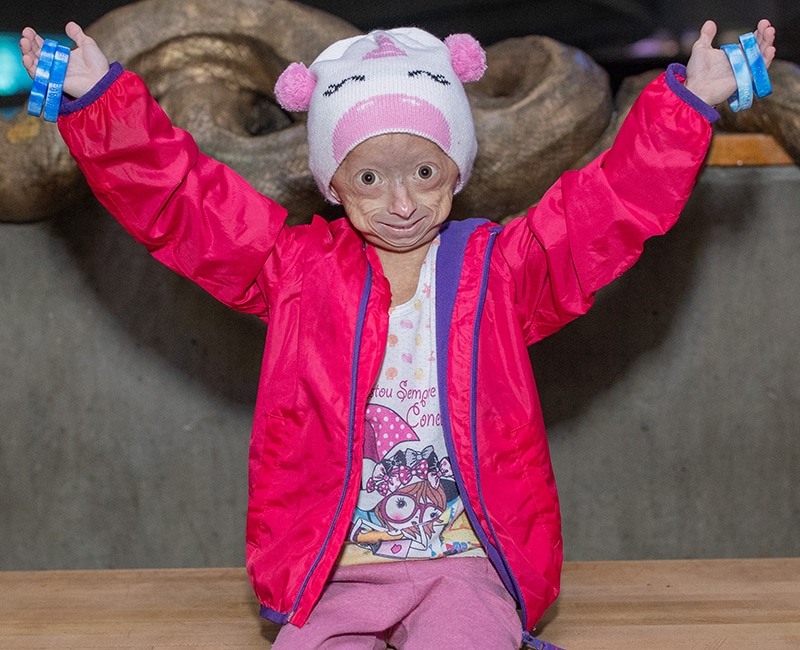
Жаңа жыл құтты болсын! Барлығына дені сау, тыныш демалыс болды деп үміттенеміз.
Біз 2021 жылды осымен бастап жатырмыз қызықты зерттеу жаңалықтары. Қаңтар айында ғылыми журнал Табиғат Прогерияның тінтуір үлгісіндегі генетикалық редакциялауды көрсететін серпінді нәтижелерді жариялады көптеген жасушаларда Прогерия тудыратын мутацияны түзетіп, бірнеше негізгі аурудың белгілерін жақсартты және өмір сүру ұзақтығын күрт арттырды тышқандарда.
PRF бірігіп қаржыландырған және PRF медициналық директоры доктор Лесли Гордонмен бірлесіп жазған зерттеу ауру тудыратын мутацияны түзетуге бағдарламаланған базалық редактордың бір рет инъекциясы арқылы тышқандар емделмеген Progeria тышқандарына қарағанда 2,5 есе ұзақ өмір сүретінін көрсетті. сау тышқандардағы кәріліктің басталуымен сәйкес келетін жасқа. Маңыздысы, емделген тышқандар сау тамыр тінін де сақтап қалды - бұл маңызды нәтиже, өйткені тамырлардың тұтастығын жоғалту Прогериясы бар балалардағы өлімнің болжамы болып табылады.
Зерттеуге генетикалық редакциялау саласындағы әлемдік сарапшы жетекшілік етті. Дэвид Лю, PhD, Кең институтының, MIT, Кембридж, магистратура, Джонатан Браун, Вандербильт университетінің жүрек-қан тамырлары медицинасы бөлімінің ассистенті және Фрэнсис Коллинз, MD, PhD, Ұлттық денсаулық сақтау институтының директоры.
Бұл нәтижелерді зерттеу үшін қосымша клиникаға дейінгі зерттеулер қажет, олар бір күні клиникалық сынаққа әкеледі деп үміттенеміз. Әрі қарай ілгерілеушілікке қол жеткізілген сайын сізді осы қызықты нәтиже туралы хабардар етуді асыға күтеміз!
Бұл қызықты жаңалық туралы толығырақ оқыңыз Мұнда.
Біз 2021 жылға аяқ басқан кезде, осындай прогреске қол жеткізуге мүмкіндік беретін СІЗ сияқты серіктестерге алғысымызды білдіреміз.
Өткен жылы жалғыз, Progeria зерттеу қоры:
- Progeria, лонафарниб үшін FDA мақұлдаған алғашқы емдеу арқылы маңызды кезеңге қол жеткізді;
- ПРФ қаржыландыратын клиникалық сынаққа (COVID 19-ға байланысты саяхатқа рұқсат етілген кезде) Бостон балалар ауруханасына бүкіл әлемнен прогериясы бар балаларды әкелді;
- Біздің 10-шы халықаралық Progeria ғылыми семинары, 30 елден рекордтық 370 тіркеушіні жинап, біздің веб-негізделген бірінші ғылыми кездесуімізде;
- Бізді емдеуге және болашақ емдеуге апаратын негізгі бағдарламалық әрекеттерімізді шын жүректен жалғастырамыз!
Koblan LW, Erdos MR, Wilson C, Cabral WA, Леви Дж.М., Ионг, ЗМ, Таварес UL, Davison L, Gete YG, Mao X, Newby GA, Doherty SP, Narisu N, Sheng Q, Krilow C, Lin CY, Гордон LB, Cao K, Collins FS, Brown JD, Liu DR. In Vivo Аденин негізін өңдеу Хатчинсон-Гилфорд прогерия синдромын құтқарады Табиғат. 2021 жылдың 6 қаңтары
